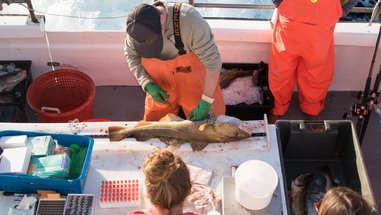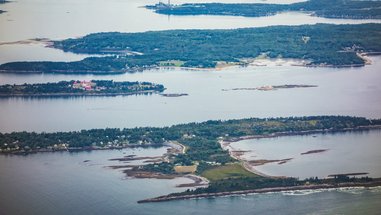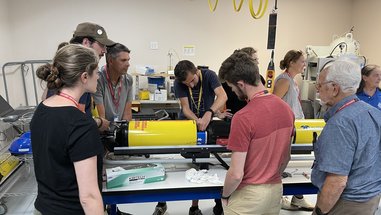Fisheries Ecology
Our lab investigates ecological information about economically important fish, to ensure that fisheries can adapt to changes and operate at world-class levels.

What baseline data do we need to collect now to better measure ecosystem change over time?
How has rapid warming affected the Gulf of Maine and what can we expect in the future?
How can we improve our management of fisheries and other marine resources?
How do we support communities to investigate changing ecosystems in their own backyards?

Over the last several decades, Gulf of Maine coastal regions have seen dramatic declines in groundfish, an explosion of lobsters, habitat loss and recovery periods for critical species like alewives, and the appearance of more southerly species such as black sea bass. These and other major ecosystem changes can have cultural and economic consequences.
Our team of scientists conducts innovative, transdisciplinary research to understand the complex coastal and marine ecosystems in the Gulf of Maine and beyond. We apply that knowledge to the region's most challenging environmental issues to advance the long-term sustainability, growth, and resilience of the Gulf of Maine ecosystem and the people who depend on it.
We then develop products and deliver services that turn our ecosystem science into on-the-ground impact, whether that be in a port meeting, a classroom, a town hall, or a boardroom.
Our lab investigates ecological information about economically important fish, to ensure that fisheries can adapt to changes and operate at world-class levels.
The Ecosystem Investigation Network supports field-based, collaborative research into climate-driven changes happening in the Gulf of Maine and its watershed. Our goal is to bring …
The Biological Oceanography Lab studies the impact that environmental conditions and trophic interactions have on marine animals.
Learn more about our ecosystem monitoring efforts by exploring our 2024 Casco Bay Ecosystem Report.
Learn MoreThe ocean is a big, ever-changing system. Fish are constantly moving around and weather conditions can change in an instant. This makes studying marine ecosystems …
Perspectives
Every spring, alewives make an epic journey from the ocean to Maine's rivers and lakes, carrying vital nutrients that sustain entire ecosystems. Discover why scientists …
Perspectives
GMRI Senior Research Manager Dr. Andrew Allyn talks about how scientists use computer models to understand where fish are in the Gulf of Maine, and …
Gulf of Maine, Explained
Wild blue mussels seem to be disappearing in the Gulf of Maine. Scientists are now seeking to understand the extent of the loss and the …
Press Clips


